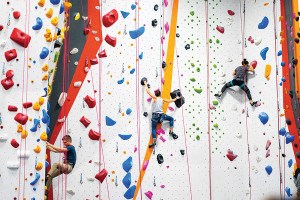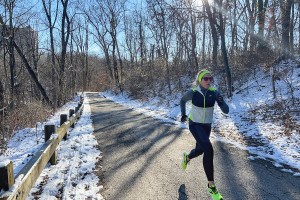Meet a Health Hero: Steve Paul
» You can vote for Steve here from August 22nd through September 18th.
Name: Steve Paul
Role: Special Olympics coordinator at The Bancroft School
What motivates you to try and make Philadelphia a healthier place?
I have been coaching Special Olympics at Bancroft for almost two decades and have been heavily involved in the Special Olympics community. I have learned so many things from my athletes and their families. I have seen what real struggle is and through that I have seen what real strength looks like. Over the years, I’ve seen many students come through The Bancroft School and before they came here, they were told what they weren’t able to do. I’m motivated every day to show the community, their families, their friends and the athletes themselves not what their disabilities are but what their abilities are. Any opportunity to get the young people in this community moving and active and living a healthy and happy life that’s what inspires me.
Additionally, according to the CDC, individuals on the autism spectrum are 50 percent more likely to be obese than their neurotypical peers. At The Bancroft School, where we serve students with autism and other developmental disabilities, health and fitness have to be an integral part of our school day — it’s absolutely vital to help each student live his healthiest life to his fullest potential.
Describe a health or fitness-related turning point in your life?
I think that I came out of the womb with a baseball glove in one hand, a basketball in the other and cleats on my feet. Sports have always been a major part of my life, but when I was in high school, my basketball coach introduced me to the weight room. When I was young I was under the impression that skill on the basketball court and work in the weight room were diametrically opposed to each other. I convinced myself that it would hurt my flexibility and athleticism on the court but my coach gave me direction on how to make it work and the importance of incorporating it into my life not only for sports but for my general health as well. I became a gym rat after that and I probably haven’t missed more than a few weeks in the gym over the past 24 years.
What policy would you institute to make Greater Philadelphia a healthier region?
I’m fortunate to work in a school environment, where physical education is mandated. However, for many students in our region and across the country, one gym class a few days a week is the only activity they have. With recess times shrinking and funding for youth sports at risk, it’s no surprise we’re continuing to see a rise in incidences of childhood obesity and obesity-related illnesses. If I could institute one policy in our region, I’d love to see every child participate in a youth sport outside of the classroom.
In addition to the obvious health and wellness benefits, these programs like Special Olympics at The Bancroft School impart the value of working together as a team, striving for a goal and supporting each other — all crucial skills for a successful, independence life after graduation.
What’s the most important part of your health or wellness regimen?
The most important part of my health regimen is structure. When I go to the gym in the morning, I don’t just have a general idea of what I want to do, I have an exact plan down to the minute. When I first started out, I just browsed around the gym trying to figure out what I should do and it wasn’t working at all for me. So I read, researched and developed a fitness plan that worked for me. I carry around a notebook in the gym and write everything down, and then next time I do the same workout, I challenge myself to get better. I find that structure helps me as a Special Olympics coach at The Bancroft School as well. I come into practice with a plan on the drills I want to do and what I want to work on and I have it down to the minute. Of course things come up and I have to adapt but that outline I have is such an asset. It helps my athletes as well, as they know whatever drill or activity we’re doing isn’t going to last more than 10 minutes. I’ll tell them, “You can do anything for 10 minutes.”
What is your number one piece of health-related advice or encouragement?
I would have to say that it’s very important to put your ego aside when it comes to fitness, by that I mean don’t be afraid to ask questions and listen to people who know more than you. I know how difficult it can be to try something new or something that you’re not really sure of. It’s super intimidating! If you can put that all aside and watch how people train and listen to their ideas, the possibilities are endless. Every year I feel like I learn something new just by observing people around me, and that includes our Bancroft athletes. They show me what it is to be determined and live by the most important mantra, “Always keep fighting and never give up.”
Like what you’re reading? Stay in touch with Be Well Philly—here’s how:
- Like Be Well Philly on Facebook
- Follow Be Well Philly on Twitter
- Follow Be Well Philly on Instagram
- Follow Be Well Philly on Pinterest
- Get the Be Well Philly Newsletter


